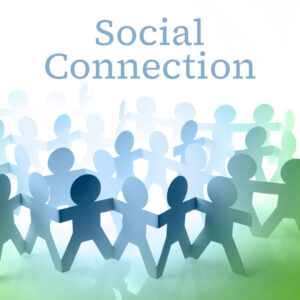Health Aging Part 9: Social Connection
By Robin Bush, ISR Communications
Do you know the one thing you can do to transform your health and well-being and decrease your risk of heart disease, anxiety, high blood pressure, depression, substance abuse, and dementia? It’s social connection. It’s the key to health and happiness. Today, try making a choice for better health by calling someone to say hello, asking them for tea, or suggesting they join you for a walk. You’ll feel better. When we connect, we experience a range of emotions that often include laughing, crying, or venting, all of which release dopamine and endorphins – those neurotransmitters responsible for happiness and good mood.
The Good Life: Lessons from the World’s Longest Study of Happiness, by Robert Waldinger, MD, and Marc Schulz, Ph.D., is a new book about a study at Harvard that began in the 1930s and followed over 600 participants for their entire adult lives. The study asked participants about their health, income, marital status, hopes, fears, disappointments, regrets, accomplishments, satisfaction, and more. What was discovered was the key to well-being was not diet and exercise or achievements; instead, the one thing that continuously emerged as being of the most significant importance was good relationships. Through personal stories, this book shows us it’s never too late to strengthen relationships or build new ones. This interesting and insightful book is filled with life stories that may transform how you choose to live each day.
You can also listen to him speak in his TED talk at TED.com called What Makes a Good Life.
Relationships, whether with friends, romantic partners, coworkers, or groups you join for conversation or walks, or travel, all contribute to leading a healthier and happier life. Our needs and the depth and breadth of our relationships differ at different life stages. As we age, what matters is spending quality time with those people who matter to your happiness and letting them know how much they matter to you.
The book suggests something we can all do today. “Think about someone, just one person, who is important to you. . .Think about what they mean to you, what they have done for you. Where would you be without them? Who would you be? Now think about what you would thank them for if you thought you would never see them again. And at this moment—right now—turn to them. Call them. Tell them.”
“Human beings long for connection, and our sense of usefulness derives from the feeling of connectedness. When we are connected – to our own purpose, to the community around us, and to our spiritual wisdom, we are able to live and act with authentic effectiveness.”
– Michael Meade
Dr. Waldinger also suggests you stop and consider your connections with people in your life. Who do you look to for safety and security? For learning and growth? For emotional closeness? For romantic intimacy? For practical and informational support? For fun and relaxation? To help you feel good about yourself? Do you have someone in each area? These are the pillars of support that you need to feel connected. “It’s never too late to deepen the connections that matter to you.”
Note: U.S. Surgeon General Dr. Vivek Murthy warns about the public health crisis that loneliness, isolation, and disconnection pose to the American public. Disconnection affects our mental, physical, and societal health. Loneliness and isolation increase individuals’ risk of developing mental and health challenges in their lives. Lacking connection can increase the risk of premature death as much as smoking up to 15 cigarettes a day. “Living in isolation reduces our chances of survival, and social isolation increases the risk for premature mortality by 29%, and poor social relationships, social isolation, and loneliness can increase your risk of heart disease by 29% and stroke by 32%. Smaller social network size is also associated with an increased risk of type 2 diabetes and other diabetic complications, including heart attacks and kidney disease.”

